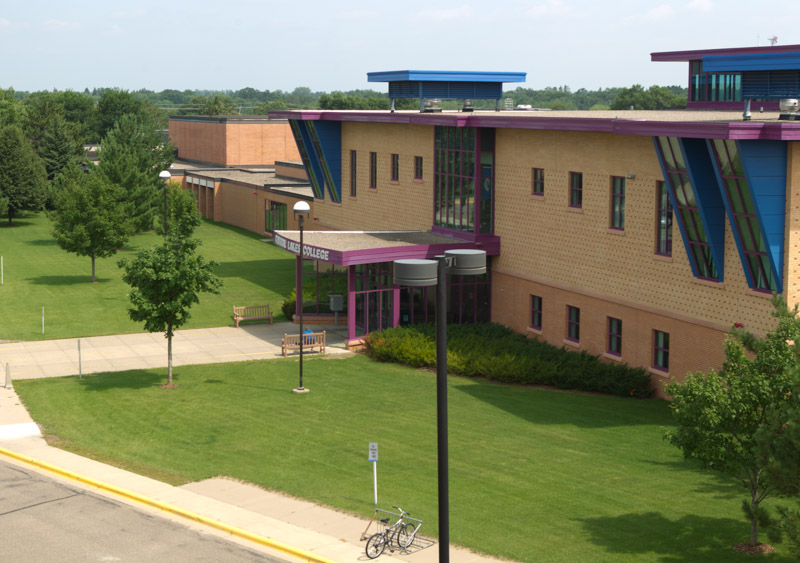Psychology Transfer Pathway A.A. Degree
Program Information
Psychology is the study of behavior and mental processes. People sometimes think of psychology as the study of mental and emotional problems, or as psychotherapy, but the field is actually much broader than this. Psychology uses the scientific method to study human behavior in all its many forms, from the genetic level and the biological basis of behavior, to understanding how individuals and groups behave in everyday activities. Psychology includes the study of what we have in common with other human beings, such as how we learn and remember, along with what makes us unique individuals – our personalities. In Psychology, you will study what makes people thrive and grow, as well as what might lead to problems. The Psychology Transfer Pathway provides a broad base of general education relevant to psychology careers, and prepares students for transfer into a Psychology baccalaureate degree at Minnesota State universities.
Program Outcomes
Graduates will be able to:
- Describe key concepts, principle and overarching themes in psychology
- Develop a working knowledge of psychology’s content domains
- Describe applications of psychology
- Use scientific reasoning to interpret psychological phenomena
- Demonstrate psychology information literacy
- Engage in systematic problem-solving inferred by psychological research
- Interpret, design or conduct basic psychological research
- Incorporate sociocultural factors in scientific inquiry
- Use statistical programs to augment scientific inquiry
- Apply ethical standards to evaluate and/or conduct psychological research and practice
- Build and enhance interpersonal relationships
- Explore values and/or practices that build community at local, national and global levels
- Demonstrate effective writing for different purposes including basic APA style
- Exhibit effective presentation skills for different purposes
- Interact effectively with others
- Demonstrate effective communication skills
Special Program Requirements
- These requirements apply to new students, and students who have been absent from this college one academic year or longer.
- At least one semester before you plan to graduate, complete an Application to Graduate.
- Student must obtain a grade of “C” or higher in each of the four required (12 credits) Communications courses.
- A total of 60 college level credits with a cumulative GPA of 2.0 or higher are required for an Associate of Arts Degree.
- A cumulative GPA of 2.0 or higher in all Minnesota Transfer Curriculum courses is required to complete the MnTC.
- 15 credits must be earned at Central Lakes College to be eligible for an Associate of Arts Degree.
- Classes may meet requirements for more than one goal area, but credit will not be awarded for any course twice.
Transfer Opportunities
The Psychology Transfer Pathway A.A. Degree offers students a powerful option: the opportunity to complete an Associate of Arts degree with course credits that directly transfer to designated Psychology bachelor’s degree programs at Minnesota State universities. The curriculum has been specifically designed so that students completing this pathway degree and transferring to one of the seven Minnesota State universities enter the university with junior-year status. All courses in the Transfer Pathway associate degree will directly transfer and apply to the designated bachelor’s degree programs in a related field. Universities within the Minnesota State system participating in the Psychology Transfer Pathway include: • Bemidji State University – BA/BS • Metropolitan State University – BA • Minnesota State University, Mankato – BA/BS • Minnesota State University, Moorhead – BA • Southwest State University – BA • St. Cloud State University – BA • Winona State University – BA
Employment Statistics
For more information regarding employment statistics, career salary information and estimated job growth, follow the resource links below:
https://apps.deed.state.mn.us/lmi/ces/
http://www.bls.gov/ooh/home.htm
Salary information from indeed.com

Program Course Requirements
Required Discipline Courses (14 credits)
PSYC 2421 General Psychology (Goals 2,5) OR
PSYC 2423* Honors General Psychology (Goals 2,5), 4 cr
PSYC 2427* Statistics for Psychology (Goal 5), 4 cr
PSYC 2431* Human Development (Goal 5) OR
PSYC 2441 Social Psychology (Goals 5,7A) OR
PSYC 2470* Understanding Psychological Disorders (Goals 5,7A), 3 cr
Additional Psychology course, 3 cr
Required MnTC Courses
***An A.A. degree requires a minimum of 40 credits, complete all ten goal areas and a cumulative 2.0 GPA for the Minnesota Transfer Curriculum (MnTC).
Goal 1 – Communications, 9-11 cr
COMM 1410 Introduction to Communication (Goal 1) OR
COMM 1420 Interpersonal Communication (Goal 1) OR
COMM 1422* Honors Interpersonal Communication (Goal 1)
ENGL 1410* Composition I (Goal 1) OR
ENGL 1420* Honors Composition I (Goal 1)
ENGL 1411* Composition II (Goal 1) OR
ENGL 1421* Honors Composition II (Goals 1,9)
Goal 2 – Critical Thinking**, Met with required course
Goal 3 – Natural Sciences, 6 cr
BIOL 1404 Human Biology (Goal 3) recommended
2 disciplines recommended, 1 lab course required
Goal 4 – Math/Logical Reasoning, 3-5 cr
MATH 1460* Introduction to Statistics (Goal 4) OR
MATH 1461* Honors Intro to Statistics (Goals 2,4) OR
MATH 1470 College Algebra (Goal 4)
Goal 5 – History/Social Behavioral Sciences, 1 cr
8 credits are met with required courses. For the remaining credit, choose any discipline other than PSYC.
Goal 6 – Humanities and Fine Arts, 9 cr
Recommended:
PHIL 2420 Ethics (Goals 6,9) OR
PHIL 2421* Honors Ethics (Goals 6,9)
2 disciplines required, 3 recommended
Goal 7 – Human Diversity or Race, Power & Justice**, Met with required course
Goal 8 – Global Perspective**, 1 course
Goal 9 – Ethic and Civic Responsibility**, 1 course
Goal 10 – People and The Environment**, 1 course
Fitness for Life, 2 cr
PHED 1594 Fitness for Life OR
Choose any other HLTH or PHED Fitness for Life course
Student Success, 1-3 cr
CCST 1510 College Success Skills recommended
Electives, As needed to complete 60 credits
*Denotes Prerequisites
**Many courses from Goals 1 – 6 also meet Goals 7 – 10. Credits count only once. Students are advised to select MnTC courses with multiple goal assignments whenever possible.
GRADUATION REQUIREMENT – 60 CREDITS
Program Instructors
| Photo | First Name | Last Name | Position | Department | Phone | Alt. Phone: | URL | wdt_ID | Details | |
|---|---|---|---|---|---|---|---|---|---|---|
 |
Aubrey | Beadell | Advisor | TRIOStudentSupportServices | (218) 855-8014 | aubrey.beadell@clcmn.edu | 1 | More details | ||
 |
Nick | O'Reilly | Occupational Skills Program College Lab Assistant | OccupationalSkills | 218-855-8077 | Nicholas.oreilly@clcmn.edu | 2 | More details | ||
 |
Kevin | Lomax | Automotive Lab Assistant | Automotive Faculty | 218-855-8000 | KLomax@clcmn.edu | 3 | More details | ||
 |
Jody | Flynn | Accessibility Services Assistant | Accessibility | 218-855-8056 | jody.flynn@clcmn.edu | 5 | More details | ||
 |
Deana | Bobzien | Instructor | CollegeCareerStudies - Mathematics - Supportive Services | 218-855-8339 | deana.bobzien@clcmn.edu | 7 | More details | ||
 |
Brianna | Rajkowski | Advisor | TRIOStudentSupportServices | 218-855-8228 | brianna.rajkowski@clcmn.edu | 8 | More details | ||
 |
Tajia | Anderson | PSEO Specialist | Admissions - CollegeCreditInHighSchool- PSEO | (218) 855-8079 | tajia.anderson@clcmn.edu | 10 | More details | ||
 |
David | Gray | Instructor | History | 218-855-8189 | david.gray@clcmn.edu | 14 | More details | ||
 |
Jim | Nagy | Adjunct Instructor | GraphicDesign | 218-855-8157 | james.nagy@clcmn.edu | 15 | More details | ||
 |
Brandon | Schneider | Instructor | HeavyEquipment | 218-894-5179 | brandon.schneider@clcmn.edu | 16 | More details | ||
 |
Natalia | DePauw | Director of Dual Enrollment | PSEO - CollegeCreditInHighSchool - Advising | 218-855-8263 | natalia.depauw@clcmn.edu | 18 | More details | ||
| Amy | Disterhaupt | Admissions Specialist | Admissions | 218-855-8250 | amy.disterhaupt@clcmn.edu | 20 | More details | |||
 |
Nick | Heisserer | Dean of Brainerd Career & Technical Programs | Administration | 218-855-8067 | nick.heisserer@clcmn.edu | 21 | More details | ||
 |
Matthew | Krueger | Environmental Health and Safety Officer | Maintenance - Security - Safety | 218-855-8115 | matthew.krueger@clcmn.edu | 22 | More details | ||
 |
Mark | Lindquist | Instructor | Music | 218-855-8203 | mark.lindquist@clcmn.edu | 23 | More details | ||
 |
Jeremy | Goddard | Bookstore/Print Shop | Bookstore Supportive Services | 218-855-8146 | Jeremy.Goddard@clcmn.edu | 25 | More details | ||
 |
Sarah | Jennissen | Instructor | PracticalNursing | 218-894-5308 | sarah.jennissen@clcmn.edu | 26 | More details | ||
 |
Cash | Robinson | Academic Advisor | TRIOUpwardBound - Advising | 218-855-8035 | cash.robinson@clcmn.edu | 28 | More details | ||
 |
Ryan | Wright | Enrollment Representative | Admissions - CampusTours | 218-855-8013 | ryan.wright@clcmn.edu | 31 | More details | ||
 |
Steve | Wenzel | Instructor | PoliticalScience | 218-855-8073 | stephen.wenzel@clcmn.edu | 32 | More details | ||
 |
Julie | Woitalla | Instructor | NursingASDegree - PracticalNursing | 218-855-8168 | julie.woitalla@clcmn.edu | 33 | More details | ||
 |
Josh | Zaborowski | Upward Bound Advisor | TRIOUpwardBound - Assessment | 218-855-8032 | joshua.zaborowski@clcmn.edu | 35 | More details | ||
 |
Paul | Zimmerman | Instructor | Diesel Faculty | 218-894-5143 | paul.zimmerman@clcmn.edu | 36 | More details | ||
 |
Ed | Uhlenkamp | Instructor | FarmBusinessManagement | 218-894-5160 | edward.uhlenkamp@clcmn.edu | https://dynamicforms.ngwebsolutions.com/ShowForm.aspx?RequestedDynamicFormTemplate=32c40b45-028c-46d6-9f79-9c1edc503713 | 38 | More details | |
 |
James | Velde | Instructor | FarmBusinessManagement | 218-234-3981 | james.velde@clcmn.edu | https://dynamicforms.ngwebsolutions.com/ShowForm.aspx?RequestedDynamicFormTemplate=cff3bff4-005f-4f5c-82a8-4c6aed02c8e9 | 39 | More details |
Photo:
First Name:
Last Name:
Position:
Phone:
Email:
